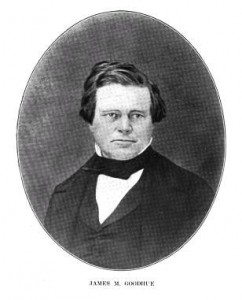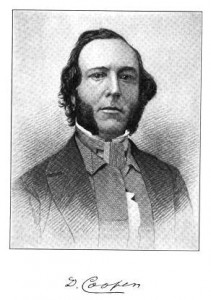It is often supposed that there was a “Golden Age” in which journalism, politics, and the law were marked with civility. The problem with this theory, however, is identifying exactly when this supposed Golden Age exited. We can safely rule out 1851, as evidenced by an incident involving James Goodhue, the editor of the Minnesota Pioneer, Minnesota’s first newspaper, which still exists in the form of the
Pioneer Press.

James Goodhue
This incident began with the publication of an editorial in the January 16, 1851, of the Pioneer. In that editorial, editor James Goodhue was highly critical of U.S. Marshal Alexander Mitchell, and Supreme Court Justice David Cooper. Of Cooper, the editorial stated:
He is not only a miserable drunkard, who habitually gets so drunk as to feel upward for the ground, but he also spends days and nights and Sunday, playing cards in groceries. He is lost to all sense of decency and self respect. Off the Bench he is a beast, and on the Bench he is an ass, stuffed with arrogance, self conceit and a ridiculous affectation of dignity. . . . On his passage up the Minnesota river last summer, paying such attentions to a certain California widow on board, as a sot well could pay, he not only kept drunk, but when the boat returned to Fort Snelling, and the news there met him, of the death of his wife in Pennsylvania, he was so shamefully inebriated, that the awful intelligence scarely aroused him.
An advance copy of the paper found its way to on January 15 to Joseph Cooper, the younger brother of the judge. He confronted Goodhue on the street with his fists, and both men drew guns. The Sheriff of Ramsey County, along with some bystanders, managed to initially break up the fight. The younger Cooper, however, managed to charge Goodhue with a knife and stab him in the stomach. Goodhue also managed to break free and shot Cooper in the groin.
No charges were pursued by either man, and Goodhue recovered from his wounds after being confined to his bed for several weeks. Joseph Cooper, on the other hand, was said to have died some two or three months later, “his death being hastened by the pistol wound he had received”.
Justice Cooper’s term expired in 1853. He remained in Minnesota practicing law until 1864, when he moved to Nevada Territory. He is said to have died “in darkness” in an inebriate asylum in Salt Lake City.
References:
Holcombe, et al, Minnesota in Three Centuries, Vol. 2, pp. 449-50 (1908).
Hage, Newspapers on the Minnesota Frontier, pp. 35-38 (1967).
Marray, Recollections of Early Territorial Days and Legislation, Collections of the Minnesota Historical Society Vol. 12, p. 103, 113 (1908)
Elliott, The Supreme Court of Minnesota, The Green Bag, Vol. 4, pp. 113, 118 (1892).

